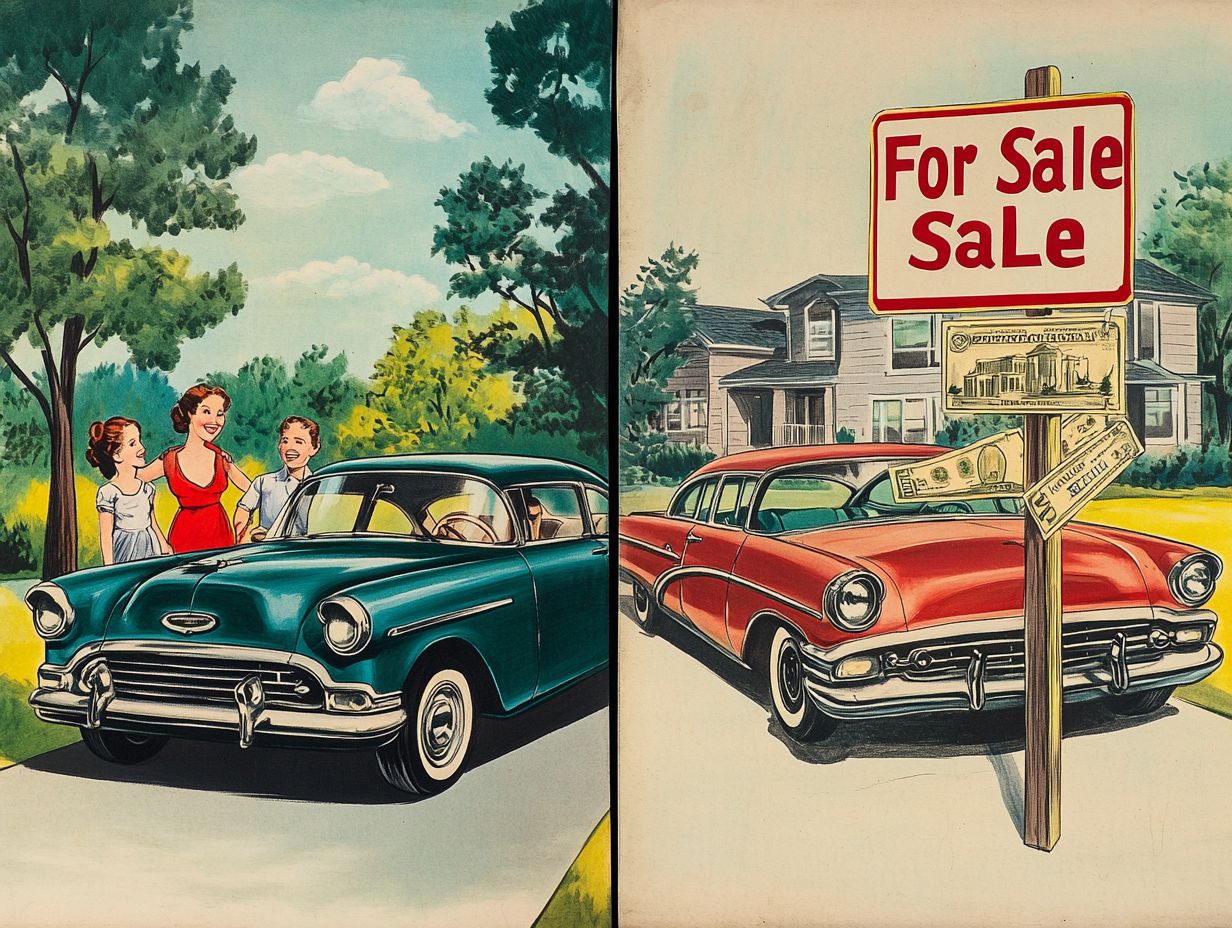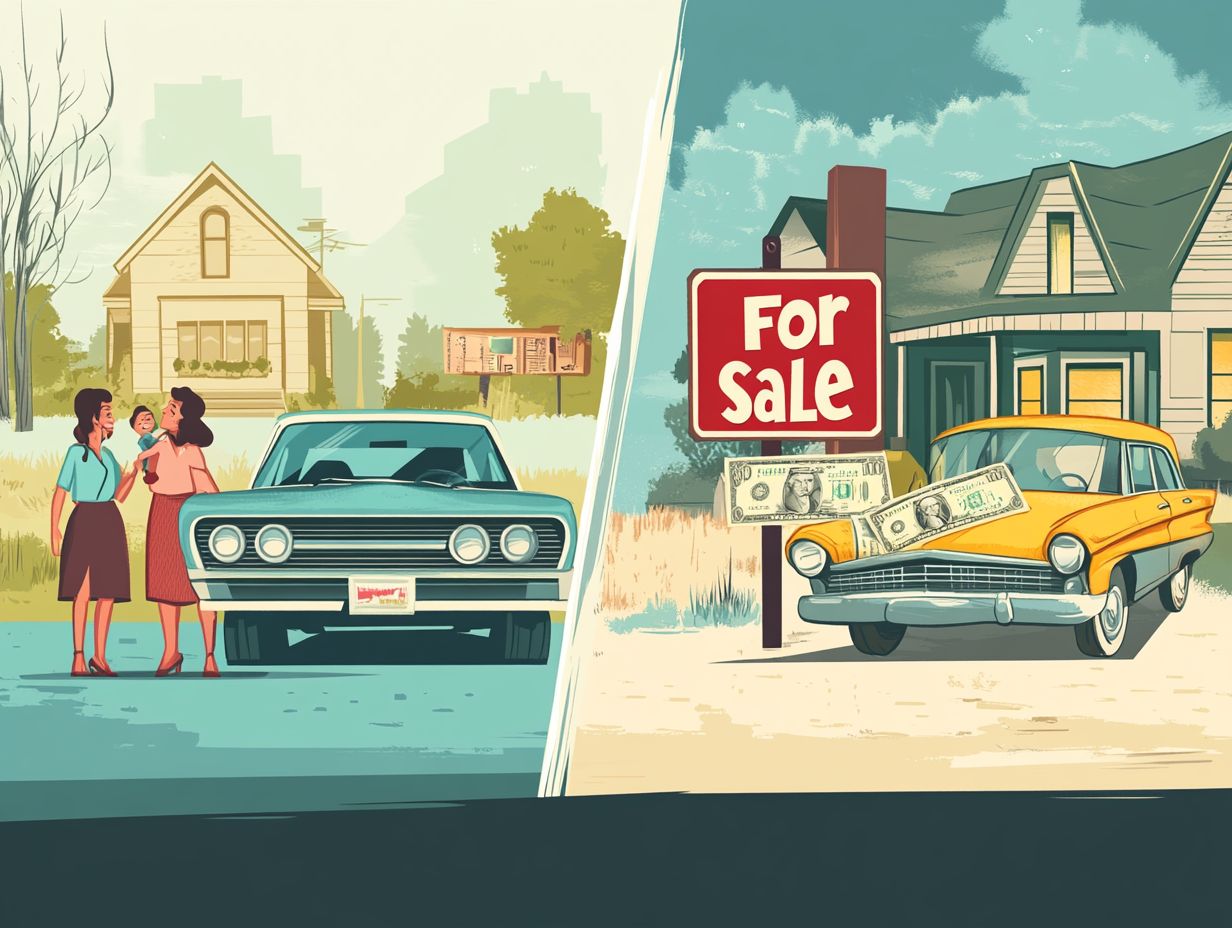The Pros and Cons of Buying a New Car
Considering the purchase of a new car? It s a significant decision, full of advantages and disadvantages.
On one hand, new cars come with warranties, unmatched reliability, and the latest features tailored to your preferences. On the other hand, they carry a higher price tag, experience rapid depreciation, and may have limited availability.
Get ready to explore the exciting pros and cons of buying a new car! This article highlights key considerations to weigh before making your choice and offers some viable alternatives to help you find the best fit for your needs.
Dive in and discover all you need to know!
Contents
Key Takeaways:

- A new car comes with a warranty and offers reliable transportation, giving peace of mind to the buyer.
- You can customize your new car and enjoy modern features.
- The higher cost and quick depreciation of a new car may not be ideal for those on a tight budget.
Pros of Buying a New Car
There are key advantages to buying a new car. Several factors deserve your attention.
Money-saving offers such as low-interest rates established by the Federal Reserve can significantly enhance your purchasing power. The manufacturer’s warranty also provides peace of mind for your investment.
Plus, cutting-edge technology features enhance your driving experience, safety, and fuel efficiency, making a new car an enticing option.
Furthermore, taking advantage of attractive new car deals can lead to substantial savings, transforming your purchase into a valuable investment.
Warranty and Reliability
One standout benefit of purchasing a new car is the manufacturer’s warranty, which offers extensive coverage for repairs. This not only ensures reliability but also grants you peace of mind as an owner.
These warranties typically encompass several types, including a warranty covering the engine and transmission. This ultimately extends your vehicle’s lifespan.
Collision coverage is another crucial aspect; it ensures that, should an accident occur, necessary repairs can be managed without significant financial strain.
By familiarizing yourself with these various warranty options, you can better understand how each protection contributes to your vehicle’s overall reliability. This assurance enables you to drive confidently, knowing you’re shielded from unexpected repair costs.
Customization and Modern Features
Buying a new car allows you to embrace the latest technology and modern features. From sophisticated navigation systems to enhanced safety features, everything can be tailored to your preferences.
This new generation of vehicles offers a range of customization options that cater to your individual lifestyle. Whether you desire upgraded sound systems that deliver concert-quality audio or eco-friendly choices that help lessen your carbon footprint, the options are abundant.
Modern features like adaptive cruise control and lane-keeping assist not only enhance convenience but also significantly boost safety. With integrated smartphone connectivity, you can effortlessly access apps and manage your daily tasks while on the go.
These advancements elevate your driving experience, providing peace of mind and making every journey not just enjoyable but secure as well.
Cons of Buying a New Car

While you’ll find many advantages to purchasing a new car, it’s essential to weigh the drawbacks as well. These include the higher upfront cost compared to used vehicles and the increased monthly payments tied to auto loans. Additionally, consider the pros and cons of leasing a luxury car as an alternative option.
Depreciation is another notable factor, as it typically occurs within the first few years of ownership. Balancing these factors will help you make a more informed decision.
Higher Cost and Depreciation
One significant drawback of purchasing a new car is the considerably higher cost compared to used vehicles. This also leads to a steep depreciation rate, which means the car’s value decreases quickly over time.
This swift decline in value can profoundly affect your overall money plan and financial health. When you invest in a new vehicle, it s easy to overlook the fact that it could lose a substantial percentage of its value in just a few years.
Grasping the intricacies of depreciation is essential. It plays a crucial role in determining how much you might recoup when it s time to sell or trade in. By factoring in depreciation rates, you can evaluate whether that initial hefty price tag aligns with your long-term financial objectives. This helps you sidestep the potential pitfalls of overpaying for a vehicle that will soon be worth significantly less.
Limited Selection and Availability
One downside of purchasing a new car lies in the limited selection and availability. This is often dictated by the sales quotas imposed by manufacturers. These quotas tend to focus on popular models and trims, which significantly narrows the variety that dealerships can offer.
As a result, you may find yourself facing a restricted range of options that don t quite match your preferences or needs. This can be particularly frustrating if you re in search of specific features or styles.
Leasing vehicles offers a broad array of models, granting you greater flexibility and the possibility of more tailored options. This ultimately enhances your overall experience in the car market.
Considerations Before Buying a New Car
Before you commit make sure you re ready to evaluate your budget and financial goals. Engaging in thorough research and comparison is key, as it allows you to make an informed decision.
Don t forget to factor in costs such as auto insurance and vehicle maintenance. These elements are vital to ensuring that your choice aligns seamlessly with your overall financial well-being.
Budget and Long-Term Plans

Establishing a clear budget and understanding your long-term financial goals are essential steps before diving into a new car purchase. These factors shape your monthly payments and determine the type of auto loan for which you may qualify.
Without a well-defined budget, you might underestimate the ongoing costs of vehicle ownership like insurance, maintenance, and those sneaky fuel expenses. These elements can greatly affect overall affordability and add unnecessary strain to your monthly payments.
Determining an acceptable price range allows you to explore options that truly align with your needs and financial capabilities. By setting a realistic budget, you ll improve your chances of securing favorable loan terms while fostering long-term financial health. This strategic approach paves the way for more substantial investments down the road.
Research and Comparison
Conducting thorough research and comparison is essential when you’re considering the purchase of a new car. It enables you to understand market trends and evaluate various options, including certified pre-owned vehicles that may offer exceptional value.
Utilizing resources like consumer reports elevates this research process. You gain in-depth insights into vehicle reliability, safety ratings, and owner satisfaction.
By comparing different models side by side, you can pinpoint features that cater to your unique needs while also uncovering any hidden costs related to insurance, maintenance, or fuel efficiency.
This informed approach to decision-making ensures that you select a vehicle perfectly aligned with your budget and lifestyle. Ultimately, this leads to a more rewarding ownership experience. In today s market, where choices are plentiful, relying on trusted resources is critical for making a smart and confident decision.
Alternatives to Buying a New Car
Are you unsure about buying a new car? You’re not alone! There are several appealing alternatives at your disposal. You might explore the realm of used cars, consider the benefits of certified pre-owned options (used cars that have been inspected and come with a warranty), or even look into leasing vehicles.
Each of these choices offers unique advantages and the potential for significant savings, allowing you to find the perfect fit for your needs and budget.
Used Cars and Leasing Options
Used cars and leasing options present two compelling alternatives to purchasing a new vehicle. These choices enable you to save money while enjoying dependable rides.
Opting for a used car, particularly a certified pre-owned model, often delivers greater long-term value and the freedom of ownership. You’ll likely find that used vehicles come with lower monthly payments and reduced insurance costs compared to leasing.
On the other hand, leasing provides the allure of driving a new car every few years, free from concerns about depreciation or resale value (which means how much you can sell the car for later) perfect for those who relish the latest features.
Experts recommend weighing these options carefully, considering your personal circumstances.
It s crucial to thoroughly research a used vehicle’s history and fully comprehend lease terms to avoid any unexpected fees that could catch you off guard.
Frequently Asked Questions

What are the advantages of buying a new car?
One of the main advantages of buying a new car is being the first owner, which means you can customize the car to your liking. New cars also come with warranties, so you don’t have to worry about unexpected repairs.
What are the downsides of buying a new car?
The biggest downside is that buying a new car can be expensive. New cars depreciate quickly, so you may lose a significant amount of money if you decide to sell it in the future.
Is it worth buying a new car instead of a used car?
It ultimately depends on your personal preferences and financial situation. New cars may offer more features and a warranty, but used cars are typically more affordable and have already gone through the initial depreciation.
What should I consider before buying a new car?
Before making a decision, consider your budget, the type of car you need, and your long-term goals. It’s also essential to research the reliability and safety ratings of the car you’re interested in.
Are there any financial benefits to buying a new car?
Thinking about saving money? New cars often come with lower interest rates for financing. This can save you money in the long run. Additionally, newer cars tend to be more fuel-efficient, which can also save you money on gas.
What are the environmental impacts of buying a new car?
While new cars may have more advanced technology that reduces emissions, the manufacturing process can also have a significant impact on the environment. However, some car manufacturers are implementing more sustainable practices in their production process.






